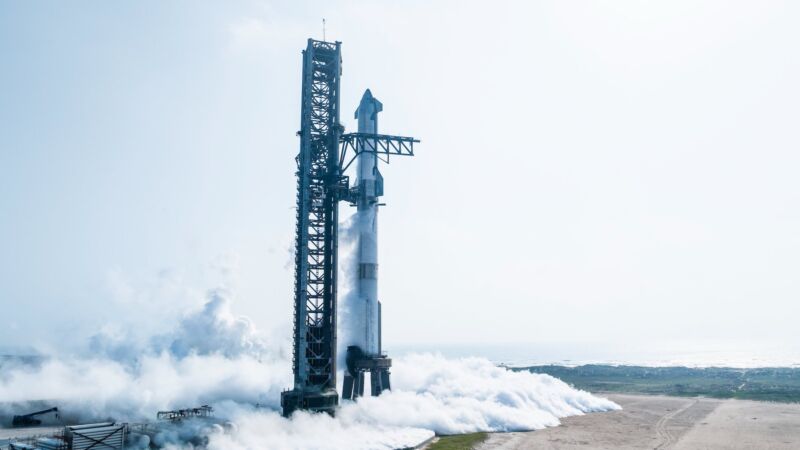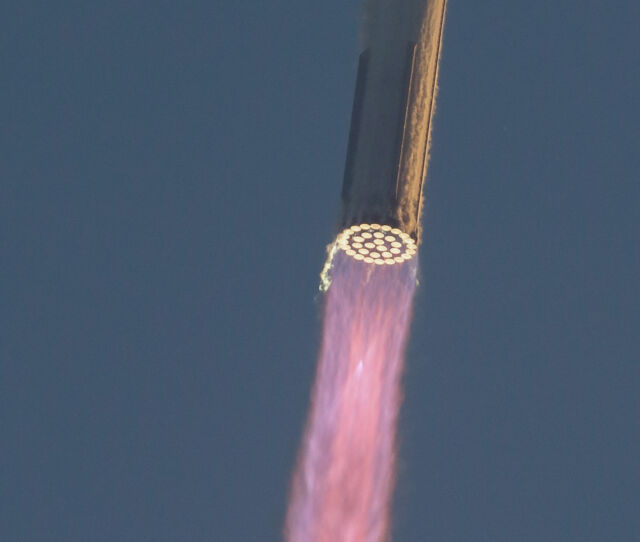
After three test flights, SpaceX has shown that the world’s most powerful rocket can reach space. Now, engineers must demonstrate the company’s next-generation Starship vehicle can get back home.
This will be the central objective for the fourth Starship test flight, which could happen as soon as early June, according to Elon Musk, SpaceX’s founder and CEO.
“Starship Flight 4 in about 2 weeks,” Musk posted on X, his social media platform, following a Starship countdown rehearsal Monday at the Starship launch site in South Texas. “Primary goal is getting through max reentry heating.”
Nearly ready to fly
With Monday’s practice countdown, SpaceX completed one of the final major tests on the next Starship rocket before it is ready to fly. SpaceX’s launch team loaded more than 10 million pounds of super-cold methane and liquid oxygen propellants into the Super Heavy booster and Starship upper stage.
The nearly 400-foot-tall (121-meter) rocket was fully stacked on its launch pad for the countdown rehearsal, which ended, as planned, before the ignition of the booster’s 33 Raptor engines. SpaceX then drained the cryogenic propellants from the rocket, and ground teams removed the Starship upper stage from the booster Tuesday for more work on the ship’s heat shield. A few days before launch, SpaceX will install the rocket’s self-destruct mechanism, which would be used to destroy the vehicle if it flies off course and threatens populated areas.
These are the final major tasks for the team at SpaceX’s Starbase facility before Starship is ready to take off on its fourth test flight. SpaceX is also waiting for a commercial launch license from the Federal Aviation Administration, which is overseeing SpaceX’s internal review of the previous Starship test flight in March.
The FAA classified the outcome of that flight as a mishap because the Starship lost control and disintegrated during reentry, before it could make a targeted intact splashdown in the Indian Ocean. For SpaceX, the March flight was a resounding success. It was the first time a Starship test flight reached near orbital velocity, with full-duration burns by all 39 Raptor engines on the rocket’s first and second stages.
After the first and second Starship test flights last year, the FAA withheld a launch license for the next flight until regulators could review all the results of SpaceX’s investigation into what went wrong on the prior mission. The FAA is responsible for ensuring commercial space launches do not endanger the public.

Stephen Clark / Ars Technica
Last week, an FAA spokesperson said SpaceX requested that regulators approve the next Starship launch before the formal conclusion of the mishap investigation into the March test flight. Instead, SpaceX asked the FAA to approve the next launch after determining the events of the previous flight did not put the public at risk. This could speed up the licensing process.
“If the FAA agrees no public safety issues were involved in the mishap, the operator may return to flight while the mishap investigation remains open, provided all other license requirements are met,” the FAA spokesperson said.
SpaceX is already testing hardware for several rockets slated to fly later this year, positioning the company to ramp up the Starship launch. The company is also building a second launch pad in Texas and plans two Starship launch sites in Florida to support a faster launch cadence.
But there’s a lot more SpaceX needs to iron out with the Starship design before it becomes operational.




















+ There are no comments
Add yours